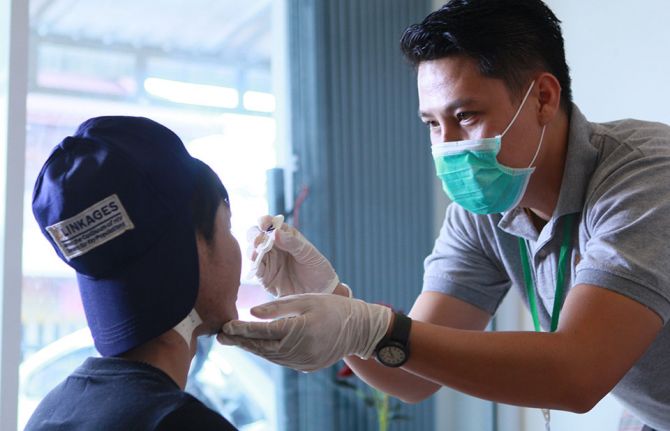

Feature Story
Oral fluid HIV testing for gay men and other men who have sex with men in the Lao People’s Democratic Republic
17 January 2019
17 January 2019 17 January 2019Only one third of gay men and other men who have sex with men know their HIV status in the Lao People’s Democratic Republic, partly because stigma and discrimination remains a barrier for accessing HIV testing in public hospitals and clinics. Complicated protocols, uneven and at times judgemental treatment by health providers and non-confidentiality of testing results further impact on HIV testing.
“Many of our friends are scared of getting an HIV test because they think the testing steps are challenging and often unfriendly,” said Phoulikhan Siphabouddy, a community-based supporter of LaoPHA, a Lao nongovernmental organization.
To address this, USAID supported the government and LaoPHA to pilot oral fluid screening in three provinces.
Most people assume that testing involves taking a blood sample. But oral fluid testing detects antibodies for HIV, not the virus itself. A test swab is gently wiped along a person’s upper and lower gums once, then the swab is placed inside a test tube containing a reagent. The result is known within 20 minutes.
Members of the community, so-called peer educators, train volunteers for the oral fluid screening. The screening is fast, easy and can be done anywhere.
Around 82% of people reached agreed to have an HIV test through oral fluid screening, compared to only 17% of referrals to clinics, according to the Ministry of Health.
“The new approach dramatically exceeded Laos’ HIV testing targets by more than 200%,” said Bounpheng Philavong, Director of the Lao Centre for HIV/AIDS and STI.
He, along with LaoPHA, are convinced that community-led services provide an enabling environment for key populations to access HIV services in a non-discriminatory manner. Linkages to care and support for people living with HIV has also improved for people who test positive, with the same community volunteers providing support for referral to trusted clinics.



